29 April 2022
The latest Talk Time relates to our current Geography topic, Explorers:
I can show off my knowledge of world geography.
Years 1 and 2:
I know the world’s seven continents and the world’s five oceans.
Years 3 and 4 (as above plus):
I know at least four European countries and their capital cities (not including those in the UK) and I know some of the main rivers and mountains in Europe.
Years 5 and 6 (as above plus):
I know some world-wide countries and some of their major cities.
Think back to your lessons as a geographer so far this year. What strategies have you used, or could you use, to help you remember these facts? It could be drawings, pictures, map, videos, songs or other resources.
Our oracy focus this half term is vocabulary so when having your discussions at home, make sure to use the correct terminology eg city, capital city, country, continent.
29 April 2022
These words all have an alternative grapheme ‘ch’ to make the ‘k’ sound.
ache
stomach
echo
anchor
character
school
technology
chemist
choir
mechanic
The children will be tested on Friday 06 May 2022.
Science – Plants
This half term we are learning about plants. We will be focussing on:
- naming a variety of common, garden and wild plants.
- identifying and naming various deciduous and evergreen trees.
- identifying and describing the basic structure of a variety of common flowering plants, including trees.
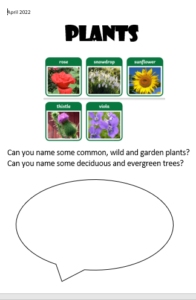
Here is a list of some of the vocabulary that will be taught in the coming weeks.
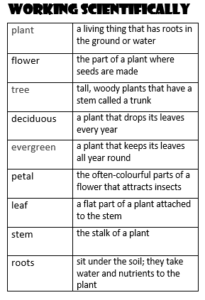
Today, we discussed the difference between a garden and wild plant and identified some plants. We also went on a plant hunt around school and used the iPads to take pictures of the plants we found. We then classified them into garden and/or wild plants.
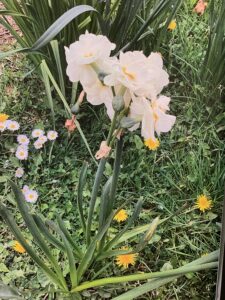

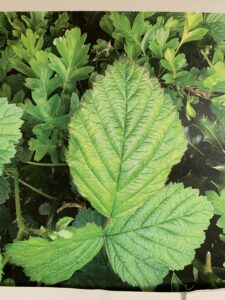


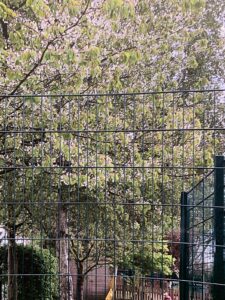
Challenge: Can your child identify any of these garden and wild plants? Can they classify them into garden and/or wild plants?
Living and Learning – I can take part in democratic decisions
This week, we have been discussing in class what it means to be part of a democratic decision.
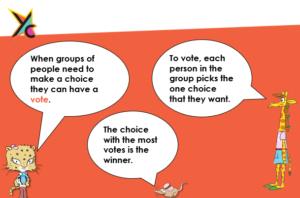
The children were given a choice of two songs to sing in collective worship. We had a vote and the song with the most votes was the song we sung. We discussed how sometimes things might not go your way but we have to be respectful to the decision.
Isla “That’s ok because next time we might get to sing the song I chose.”
Today, we had another democratic decision to make. On Friday 27th May we will be celebrating the Queen’s Platinum Jubilee-that’s 70 years as Queen! Each class will learn and perform a dance from each of her reigning decades, which we will share at the party.
The children were given a choice of two songs from the 90s (are chosen decade) and we had a vote. The song we will be performing is 5,6,7,8 by Steps.
We are gymnasts!
Year 3 have started some gymnastics with some coaches. Their first lesson was full of energy and enjoyed by all of the children.









We can take part in democractic decisions!
This week, our Living and Learning statement encourages us to learn about democracy and to take part in a democratic decision. Therefore, we took time to hold a vote in class. Read on to find out what we were voting for…
To celebrate the publication of Anna James’ fantastic new book, ‘Hetty and the Battle of the Books’, School Library Service (SLS) have partnered with publisher Barrington Stoke to launch a search for the best young reading ambassadors in Leeds.
They are looking for KS2 children who advocate reading for pleasure and encourage others to find their own love of reading with their enthusiasm for books.
Each school is invited to enter ONE pupil into the competition and the five short-listed applicants will be invited to attend an awards ceremony at Leeds Central Library on Saturday 10th July, where the winner will be announced by Anna James and receive the trophy for Leeds School Librarian 2022. The ceremony at midday will be followed by a FREE event for families with the author who will be introducing their latest book.
So our vote today resulted in Scarlet being selected to be the reading champion in our class. Next, the JLT will choose the reading champion in Key Stage 2 to be put into the draw.
Good luck!
Living and Learning: I can take part in democratic decisions.
The queen is in charge.Boris Johnson makes all the important decisions.The police make decisions.
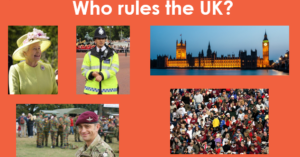
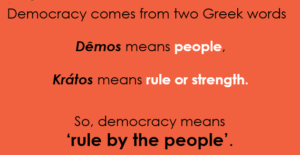
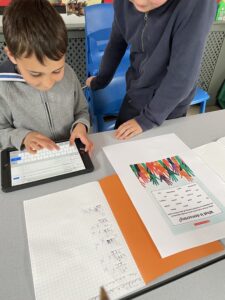
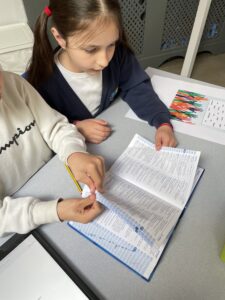
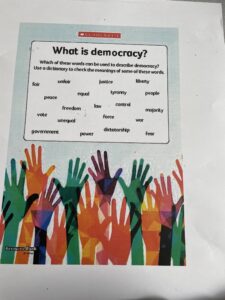
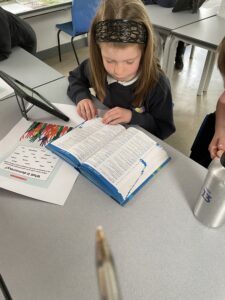
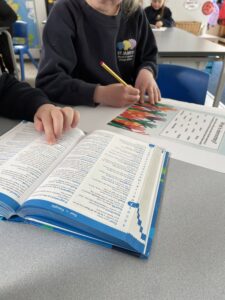
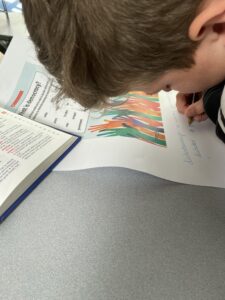
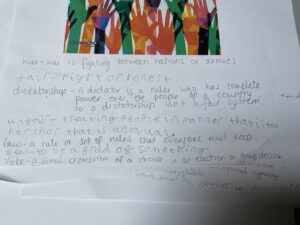
- fairness
- justice
- liberty
- freedom
- majority
- law
- government
This week’s bible story
Jesus calms a storm: Mark 4:35-41
Have a think about what peace means to you. Is it a time without conflict or is it calmness? Today, we’re going to hear a story about Jesus and his disciples who were stuck on the Sea of Galilee in the middle of a storm.
Time for reflection:
Think about the times when it seems like you’re in the middle of a storm; perhaps when there are arguments or when things seem confusing and difficult or when things are frightening. Think of Jesus being there, saying, Peace, be still. Take a moment now to hear those words, and enjoy the peace they bring.
Prayer:
Dear God,
Help us to remember, even when we’re in the middle of a storm and life seems hard, you are always there to help us feel peace.
Amen
Week beginning 25 April 2022
Sorry that you can’t be in school this week. Here are a range of resources linked to what is happening in class. Don’t forget to get in touch with your class teacher if you need support.
Maths
Follow this sequence of maths learning which is linked to ratio, proportion and negative numbers.
Lesson 1: video, worksheet, answers
Lesson 2: video, worksheet, answers
Lesson 3: video, worksheet, answers
Lesson 4: video, worksheet, answers
Lesson 5: video, worksheet, answers
Lesson 6: video, worksheet, answers
Lesson 7: video, worksheet, answers
Lesson 8: video, worksheet, answers
Lesson 9: video, worksheet, answers
You don’t have to print the worksheet. Your child can write or draw their answers on paper. Your child’s learning will be most effective if you sit with them to pause the clip and check / praise / support your child as the clip moves on.
Practise times tables on Times Table Rockstars, too. Email the class teacher if you need your child’s login and password details.
(Suggested time: 30 minutes of Maths and 15 minutes of Rockstars daily)
Spelling
Look on the homework page to find this week’s spellings. They should choose some past spellings that they feel less confident with. Your child should complete one task each day.
- Day 1: Generate more words linked to the spelling pattern or ‘rule’. You could look out for the words in the book you’re reading at home, or any other text, like a website linked to our science topic of Living Things and their Habitat.
- Day 2: Practise the spellings using two of the ideas in our Super Spelling Strategies guide. (Set yourself and others at home a challenge of using some of the words when you’re speaking, too!)
- Day 3: Write separate sentences, each containing one of the spellings. (Don’t forget to show off really neat handwriting and make sure you sentence starts with a capital letter and ends with a full stop, exclamation mark (!) or question mark (?).
- Day 4: Repeat Task 2 or 3.
- Day 5: Get an adult at home to test you on your spellings. Practise any you spell incorrectly – you could write them out carefully until you’re sure.
(Suggested time: 15-20 minutes daily)
Reading fluency.
This is the text that we will be using in school. In school, we generally follow this sequence:
- Day 1: Read the text aloud with your child listening. Read it clearly and slowly, pointing to each word as you read. Have a chat about any unfamiliar words.
- Day 2: Read aloud each sentence (a full short sentence or part of a longer sentence), and have your child read it back to you. Do this ‘echo reading’ for the whole text.
- Day 3: Read the text and talk about the effect of the punctuation on how you read it – pauses for full stops and expression for exclamations (!) or questions (?). Your child reads the text aloud.
- Day 4: Read together with expression (just like you practised on Day 3).
- Day 5: Your child reads independently and fluently.
(Suggested time: 15 minutes daily)
Reading comprehension
We’ll be using this RIC text in class to practise comprehension skills. RIC stands for:
- Retrieve: finding information in a text
- Interpret: using clues in the text to unlock information
- Choice: thinking about the author’s choice of words, techniques or organisation that make the text interesting and enjoyable to read
At school, we like to promote a passion for reading. This website has a range of extracts and interviews with different authors. Choose one author each day and read an extract from their book. If you like it, carry out your own research on the author and book.
(Suggested time: 30 minutes daily)
Writing
In writing, we will be reviewing how punctuation is used correctly in our writing. Follow this sequence of lessons on punctuation. There’s a whole series of lessons, but start at Lesson 1 and work through, doing one (or maybe even two) each day. (If you’re self-isolating in your second week, stick with the series of lessons you’ve already started and aim to complete the full series.) Finished? Try this mixed grammar practice.
(Suggested time: 30-40 minutes for each)
Topic
Our topic this half-term is Explorers. In school, we’ll be comparing an area of South America with that of the UK.
Follow these lessons on Building Locational Knowledge: South America from Oak Academy. Follow the lesson sequence. It has 4 lessons so you could do two a week. We’ll also be looking at different biomes.
(Suggested time: 30-40 minutes)
Science
This term is all about electricity.
These six lessons from Oak Academy link closely to what we’ll be doing in class this half term. Start at Lesson 1 and work through, doing two or three in the week.
If Science really motivates your child, you could also use look at these lessons all about practical Science.
(Suggested time: 30-45 minutes)
PE
Don’t forget to do some daily exercise!
Do two or three of these Five Minute Moves from Joe Wicks each day – spread them across the day as if they were playtimes, maybe!
Try working through this series of 25 lessons from the Association for Physical Education – do two or three in the week.
(Suggested time: 5 minutes daily, plus 30 minutes for the longer PE lessons)
Extra stuff…
As an extra (or as an alternative, if this helps to motivate your child)…
Geography is our topic-driver this half-term so you could brush up on your locational knowledge. You could explore some online maps and try to memorise some new countries, capitals, rivers and mountain ranges. These three lessons about Europe are worth checking out.
What about some Living and Learning? While you’re away from school, you could check out these lessons on money!
Week beginning 25 April 2022
Sorry that you can’t be in school this week. Here are a range of resources linked to what is happening in class. Don’t forget to get in touch with your class teacher if you need support.
Maths
Follow this sequence of maths learning which is linked to fractions.
Lesson 1: video, worksheet, answers
Lesson 2: video, worksheet, answers
Lesson 3: video, worksheet, answers
Lesson 4: video, worksheet, answers
Lesson 5: video, worksheet, answers
Lesson 6: video, worksheet, answers
Lesson 7: video, worksheet, answers
Lesson 8: video, worksheet, answers
Lesson 9: video, worksheet, answers
Lesson 10: video, worksheet, answers
You don’t have to print the worksheet. Your child can write or draw their answers on paper. Your child’s learning will be most effective if you sit with them to pause the clip and check / praise / support your child as the clip moves on.
Practise times tables on Times Table Rockstars, too. Email the class teacher if you need your child’s login and password details.
(Suggested time: 30 minutes of Maths and 15 minutes of Rockstars daily)
Spelling
Look on the homework page to find this week’s spellings. They should choose some past spellings that they feel less confident with. Your child should complete one task each day.
- Day 1: Generate more words linked to the spelling pattern or ‘rule’. You could look out for the words in the book you’re reading at home, or any other text, like a website linked to our science topic of Living Things and their Habitat.
- Day 2: Practise the spellings using two of the ideas in our Super Spelling Strategies guide. (Set yourself and others at home a challenge of using some of the words when you’re speaking, too!)
- Day 3: Write separate sentences, each containing one of the spellings. (Don’t forget to show off really neat handwriting and make sure you sentence starts with a capital letter and ends with a full stop, exclamation mark (!) or question mark (?).
- Day 4: Repeat Task 2 or 3.
- Day 5: Get an adult at home to test you on your spellings. Practise any you spell incorrectly – you could write them out carefully until you’re sure.
(Suggested time: 15-20 minutes daily)
Reading fluency.
This is the text that we will be using in school. In school, we generally follow this sequence:
- Day 1: Read the text aloud with your child listening. Read it clearly and slowly, pointing to each word as you read. Have a chat about any unfamiliar words.
- Day 2: Read aloud each sentence (a full short sentence or part of a longer sentence), and have your child read it back to you. Do this ‘echo reading’ for the whole text.
- Day 3: Read the text and talk about the effect of the punctuation on how you read it – pauses for full stops and expression for exclamations (!) or questions (?). Your child reads the text aloud.
- Day 4: Read together with expression (just like you practised on Day 3).
- Day 5: Your child reads independently and fluently.
(Suggested time: 15 minutes daily)
Reading comprehension
We’ll be using this RIC text in class to practise comprehension skills. RIC stands for:
- Retrieve: finding information in a text
- Interpret: using clues in the text to unlock information
- Choice: thinking about the author’s choice of words, techniques or organisation that make the text interesting and enjoyable to read
At school, we like to promote a passion for reading. This website has a range of extracts and interviews with different authors. Choose one author each day and read an extract from their book. If you like it, carry out your own research on the author and book.
(Suggested time: 30 minutes daily)
Writing
In writing, we will be reviewing how punctuation is used correctly in our writing. Follow this sequence of lessons on punctuation. There’s a whole series of lessons, but start at Lesson 1 and work through, doing one (or maybe even two) each day. (If you’re self-isolating in your second week, stick with the series of lessons you’ve already started and aim to complete the full series.) Finished? Try this mixed grammar practice.
(Suggested time: 30-40 minutes for each)
Topic
Our topic this half-term is Explorers. In school, we’ll be comparing an area of South America with that of the UK.
Follow these lessons on Building Locational Knowledge: South America from Oak Academy. Follow the lesson sequence. It has 4 lessons so you could do two a week. We’ll also be looking at different biomes.
(Suggested time: 30-40 minutes)
Science
This term is all about electricity.
These six lessons from Oak Academy link closely to what we’ll be doing in class this half term. Start at Lesson 1 and work through, doing two or three in the week.
If Science really motivates your child, you could also use look at these lessons all about practical Science.
(Suggested time: 30-45 minutes)
PE
Don’t forget to do some daily exercise!
Do two or three of these Five Minute Moves from Joe Wicks each day – spread them across the day as if they were playtimes, maybe!
Try working through this series of 25 lessons from the Association for Physical Education – do two or three in the week.
(Suggested time: 5 minutes daily, plus 30 minutes for the longer PE lessons)
Extra stuff…
As an extra (or as an alternative, if this helps to motivate your child)…
Geography is our topic-driver this half-term so you could brush up on your locational knowledge. You could explore some online maps and try to memorise some new countries, capitals, rivers and mountain ranges. These three lessons about Europe are worth checking out.
What about some Living and Learning? While you’re away from school, you could check out these lessons on money!